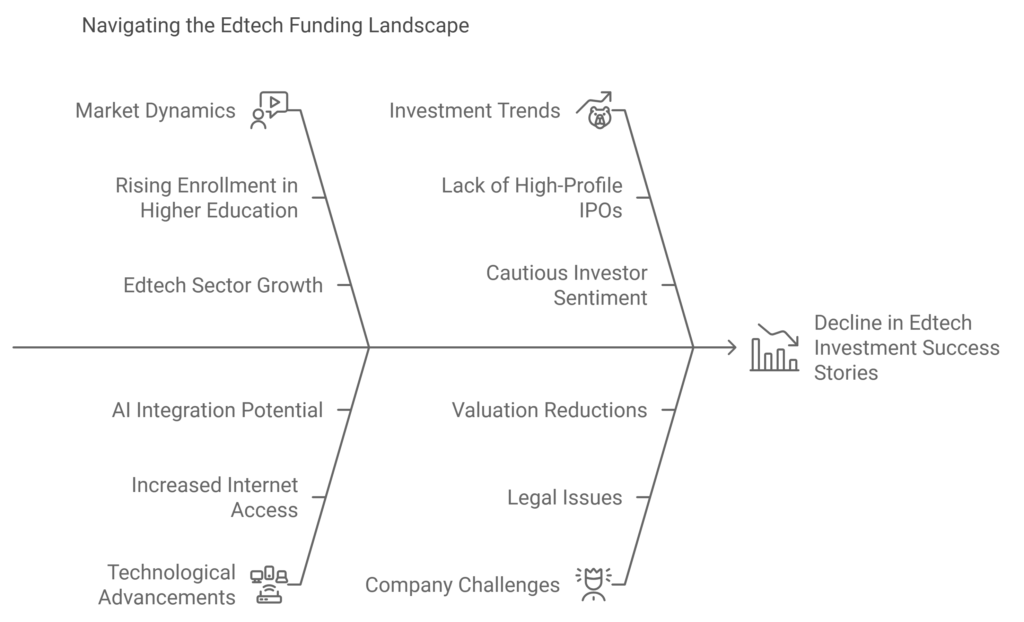With the recent news of Stoa shutting down and other notable edtech brands following suit, it’s only natural to wonder if venture capital (VC) funding is still a good bet for education startups. Let’s break this down into some key points.
As the edtech sector faces turbulent times, it’s evident that startups, especially those with significant growth histories like Byju’s, are under intense scrutiny. The challenges go beyond operational hurdles, with founder-investor relationships increasingly strained as financial pressures mount. This shift in dynamics raises questions about the role of venture capital in sustaining innovation in education. Are investors willing to stay the course when the path to profitability proves longer than expected?
Byju Raveendran, founder of Byju’s, criticized investors for abandoning the company during financial troubles. He expressed frustration that those who supported rapid growth distanced themselves at the first sign of difficulty. Since December 2021, only he has reinvested in the company, while major investor Prosus has not contributed. Byju’s current valuation is effectively zero, with recent board resignations hindering fundraising efforts. Despite legal challenges and insolvency proceedings, Raveendran remains optimistic about Byju’s future and sees his mission as more than a business venture.
The Current State of EdTech
- A Tough Climate: The edtech landscape has become quite challenging. Many startups are struggling to find their footing, and the number of venture-backed companies closing their doors has surged. In 2023 alone, over 3,200 startups worldwide shut down, which speaks volumes about the cautious mood among investors.
- What Investors Want: For edtech startups to catch the eye of VCs these days, they need to stand out with something truly unique. It’s not just about having a great idea anymore; companies must show they can scale effectively and have a solid business model. While some companies like Coursera and Duolingo have thrived, many others have found it tough to keep up.
- Changing Investor Attitudes: Investors are becoming more discerning. They want to see that a startup can adapt to the fast-paced changes in education and technology. This means that startups need to not only innovate but also prove they can sustain growth over time.
In 2024, funding for edtech startups has experienced a notable decline, with total investments exceeding $1 billion thus far, suggesting a potential low point for the sector in recent years. This trend is observable on a global scale as well as within the United States, where investment figures are significantly lower than the peaks reached before the market’s high in 2021. The scarcity of major exits, such as initial public offerings or substantial acquisitions, further underscores the challenging conditions faced by edtech companies.
Despite the reduction in funding, the demand for educational services continues to rise. Enrollment in formal education is increasing, particularly in higher education, with World Bank projections indicating that the number of post-secondary students will grow from 220 million in 2021 to 380 million by 2030. Additionally, the edtech sector is anticipated to outpace traditional education in growth, fueled by enhanced internet accessibility and scalable business models. Morgan Stanley predicts that global spending on edtech will escalate from $250 billion in 2022 to $620 billion by 2030.
The decrease in successful investment stories plays a crucial role in this downturn. Following the peak of venture-backed IPOs in 2021, which included companies like Duolingo, Coursera, and Udemy, there has been a marked absence of high-profile successes. For example, BYJU’s, previously valued at $22 billion, has encountered various challenges, including legal troubles and workforce reductions, resulting in a significant drop in its valuation.
In this difficult environment, some startups have still been able to secure funding. However, optimism remains tempered as many established companies find it challenging to attract new investments.
There is potential for recovery, as emerging technologies such as artificial intelligence may stimulate future investments in innovative educational solutions. Nevertheless, current funding levels suggest that a swift rebound is unlikely.
In a recent ted talk, Sal Khan discusses the transformative potential of AI in education, particularly through the use of Khanmigo, an AI-powered tutoring tool. He addresses concerns that students might misuse AI to cheat, arguing instead that with proper safeguards, AI can significantly enhance learning experiences

